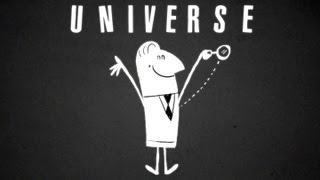(单词翻译:单击)
The universe, rather beautiful, isn't it?
宇宙非常非常美丽,不是吗?
It's quite literally got everything, from the very big to the very small.
基本上它包含了所有东西,从大到小都有。
Sure, there are some less than savory elements in there,
当然,也包含一些讨厌的东西,
but on the whole, scholars agree that its existence is probably a good thing.
但是总体来说,科学家一致认为,宇宙的存在或许是一件好事。
Such a good thing that an entire field of scientific endeavor is devoted to its study.
这让整个领域的科学家都为宇宙的探究奉献力量。
This is known as cosmology.
这就是众所周知的宇宙学。
Cosmologists look at what's out there in space and piece together the tale of how our universe evolved:
宇宙学家在探寻宇宙,并且把关于宇宙形成的各种零散的理论结合在一起:
what it's doing now, what it's going to be doing, and how it all began in the first place.
宇宙现在是什么样子,以后会是什么样子,刚开始的时候又是什么样子。
It was Edwin Hubble who first noticed that our universe is expanding,
埃德温·哈勃率先提出我们的宇宙在不断扩大,
by noting that galaxies seem to be flying further and further apart.
他指出银河看起来离我们越来越远。
This implied that everything should have started with the monumental explosion of an infinitely hot, infinitely small point.
这意味着所有东西都应该开始于在无限的热量和无限的小的点之中的巨大的爆炸。
This idea was jokingly referred to at the time as the "Big Bang,"
这个观点也就是以前开玩笑所指的“宇宙大爆炸”,
but as the evidence piled up, the notion and the name actually stuck.
但是根据各种资料所示,这个概念和这个名字是不统一的。
We know that after the Big Bang, the universe cooled down to form the stars and galaxies that we see today.
我们知道,在宇宙大爆炸之后,宇宙开始降温,形成了我们今天所看到的星星和银河。
Cosmologists have plenty of ideas about how this happened.
宇宙学家对此有很多观点。
But we can also probe the origins of the universe by recreating the hot, dense conditions that existed at the beginning of time in the laboratory.
但我们也可以在实验室中重现宇宙最初生成时高温、高密度的环境。

This is done by particle physicists.
粒子物理学者做了这个工作。
Over the past century, particle physicists have been studying matter and forces at higher and higher energies.
在过去的一个世纪中,粒子物理学家一直研究具备更高能量型态的物质和力。
Firstly with cosmic rays, and then with particle accelerators,
首先是通过宇宙射线,接下来是借助粒子加速器,
machines that smash together subatomic particles at great energies.
这是能将让次原子粒子在高能状态下粉碎的机器。
The greater the energy of the accelerator, the further back in time they can effectively peek.
加速器的能量越大,能有效地探测到的时间就更久远。
Today, things are largely made up of atoms, but hundreds of seconds after the Big Bang,
如今,万物大部分是由原子组成的,但是在宇宙大爆炸几百秒之后,
it was too hot for electrons to join atomic nuclei to make atoms.
由于温度太高,电子不能与原子核组成新的原子。
Instead, the universe consisted of a swirling sea of subatomic matter.
相反,宇宙是次原子物质组成的浑沌海洋。
A few seconds after the Big Bang, it was hotter still,
在大爆炸几秒钟后,宇宙的温度还是很高
hot enough to overpower the forces that usually hold protons and neutrons together in atomic nuclei.
高到能够控制将质子和中子局限在原子核内的力量。
Further back, microseconds after the Big Bang,
再往前推,在宇宙大爆炸后的几微秒,
and the protons and neutrons were only just beginning to form from quarks,
在中子和质子正准备从夸克形成的时候,
one of the fundamental building blocks of the standard model of particle physics.
夸克是粒子物理学中组成物质的基础。
Further back still, and the energy was too great even for the quarks to stick together.
再更往前推,这个能量大到能让夸克紧紧结合在一起。
Physicists hope that by going to even greater energies,
物理学家希望能达到更大的能量,
they can see back to a time when all the forces were one and the same,
他们能回到所有能量都合为一体的时候
which would make understanding the origins of the universe a lot easier.
以让我们更容易地了解宇宙的形成。
To do that, they'll not only need to build bigger colliders,
为了达到这一点,他们将不仅仅需要建更大的对撞机,
but also work hard to combine our knowledge of the very, very big with the very, very small
还需要更努力的结合我们关于这个很大很大、但又很小很小的宇宙的知识。
and share these fascinating insights with each other and with, well, you.
并将这些有趣的知识分享给更多人,当然,包括你。
And that's how it should be!
事情就是如此!
Because, after all, when it comes to our universe, we're all in this one together.
因为,毕竟当我们说到宇宙时,我们都在同一条船上。


